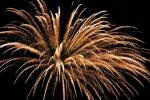Emily Chen>Senior>News-Editorial Journalism>University of Illinois
 Fireworks have become a cherished tradition during the celebration of our nation’s independence, but it may be better to leave the firework displays up to the professionals.
Fireworks have become a cherished tradition during the celebration of our nation’s independence, but it may be better to leave the firework displays up to the professionals.
In 2008, the US Consumer Product Safety Commission (CPSC) reported that approximately 7,000 people were treated in U.S. hospitals for firework related injuries.
Children and young adults under the age of 20 accounted for 58 percent of the injuries. Males made up 62 percent of the injuries in 2008. (There must be something in the male DNA that loves the thrill of blowing things up, even if it may end up being a finger or two.) With the Fourth of July just around the corner, CM wants to make sure you don’t end up in next year’s statistic.
If the thought of spending your Fourth of July in the ER is not enough to keep you away from the explosive fun, then maybe the legal constraints will be.
There are five states that completely ban the purchase of consumer fireworks, including sparklers. Sorry Delaware, Rhode Island, New Jersey, Massachusetts and New York. Looks like you’ll all be celebrating this Fourth of July from afar, but don’t worry—being a spectator can be fun!
Arizona, you’re allowed to purchase “novelty” fireworks, which include snaps, snakes and poppers. Party on (like it’s third grade).
The next level of restrictions not only permits novelties, but sparklers too. You can actually have access to some “fire” in your fireworks, Illinois, Maine, Ohio, Vermont and Iowa, so go crazy!
If you live in Hawaii or Nebraska, that’s where the laws get tricky. In these states, no statewide laws have been established. It varies from county to county, so it’s important to figure that out before you start shooting off those bottle rockets.
The remaining states permit the sale of all or most firework products, but often have restrictive selling seasons on and around major firework holidays.
Ryan Ward, a junior at Illinois State University, recounts a fireworks mishap that happened a few years ago. He and his friends were firing off bottle rockets from a car window and one of them flew back in.
“It came back into the car and we couldn’t do anything but wait for it to go off,” says Ward. “After it did none of us could hear for a few minutes.”
Ward may have avoided serious injury, but his older brother was seriously hurt when he was hit in the eye by a bottle rocket that went awry when a friend, playing a joke, knocked over the surface it was launching off.
“It was scary, someone had to drive him home because he couldn’t see out of both eyes; he couldn’t see out of the one eye for like two weeks” Ward says. “He still has a cataract in that eye.”
Many firework accidents occur when people misuse them or don’t take the precautions seriously. Fireworks aren’t toys and should be used carefully and in monitored conditions.
“Children should never play with or light fireworks, and adults should watch our demonstrations to see how powerful and dangerous illegal fireworks can be," says CPSC Chairman Inez Tenenbaum on their website.
So feel free to celebrate hard this Fourth of July, but keep in mind that safety should always come first—you wouldn’t want to end up as another number in 2010’s firework statistics report.
If you do decide to include fireworks in your holiday celebrations, the CPSC has offered the following tips for staying safe:
· Never allow children to play with or ignite fireworks
· Read and follow all warnings and instructions
· Be sure other people are out of range before lighting fireworks
· Only light fireworks on a smooth, flat surface away from the house, dry leaves, and flammable materials
· Never try to relight fireworks that have not fully functioned
· Keep a bucket of water in case of a malfunction or fire
· Do not make or use homemade fireworks



















